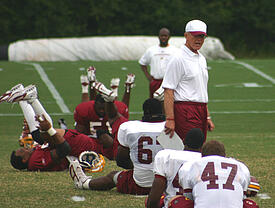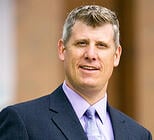"The function of education is to teach one to think intensively and to think critically. Intelligence plus character - that is the goal of true education." - Dr. Martin Luther King Jr.
 When asked about how to build a winning team, former super bowl coach and champion NASCAR owner Joe Gibbs stated “Character is first. If you can’t pass the character test, you’ve got a real problem. And then it goes to smarts. And then you go to talent. Those first two, we’ve learned big lessons in the past.” Across multiple sports, Joe Gibbs has built every winning team he has been part of with this formula. So just how is it that character trumps talent and intellect?
When asked about how to build a winning team, former super bowl coach and champion NASCAR owner Joe Gibbs stated “Character is first. If you can’t pass the character test, you’ve got a real problem. And then it goes to smarts. And then you go to talent. Those first two, we’ve learned big lessons in the past.” Across multiple sports, Joe Gibbs has built every winning team he has been part of with this formula. So just how is it that character trumps talent and intellect?
When we talk about leadership we often associate many of its qualities with talent and intellect. Our talent and intellect certainly can reflect the abilities that we excel at, as well as our mental fortitude... and these qualities can certainly get us noticed, open doors and take us places. However, it is our character that ultimately endears us to others, helps us make the right choices and then serves to sustain us in our friendships, marriages, families, professions, networks, etc., over our lifetimes. A smart but arrogant person is not endearing. A talented person with a toxic quality such as anger or bitterness can be the person that diminishes team performance, rather than enhancing it.
So just what is character?
Our character consists of our sense of morality (right vs. wrong), our values (what is desirable), our beliefs, our hopes, our attitudes, etc.. Out of these things flows the way we think, feel and behave. Since leadership is about influencing others, our character is critical, because it determines what we laugh at, what we cry at, what we celebrate, what we protest, what does or does not convict us, how we handle success, how we handle hurts and disappointments, as well as what we commit to. To use the analogy of a car, our intellect and talents are the engine and special features (cruise control, power windows, all-wheel drive, towing package, etc.), but our character reflects things like the suspension, upholstery and most importantly, the driver that steers the car. A fast but uncomfortable car is not one you want to take a long trip in. A car that is all over the road will have passengers exiting at the first chance they have.
As we look to have an enduring influence, it is the colorful variations in our character that either attract and endear us to others, perpetuate indifference, or agitate and alienate us from others. It is our character, that after weighing a certain decision-point, ultimately causes us to commit to a specific direction, action, etc.. Our commitments are not just about being correct, but about doing the right thing at the right time and going on the record for it.
Leaders are people who have the character to commit
Commitment to a cause or another person always costs us something. Commitment involves taking a risk. Because of this, commitment always involves a calculated decision - conscious or subconscious. However, the power of commitment in the life of a leader is that it precedes the unleashing of their enthusiasm, resources, faith, talent and investment - all qualities that are essential to influencing people and situations in a constructive manner. And while commitment can bring ridicule and sacrifice, it more often compounds our outputs, accomplishments and ultimately our impact in life.
It takes courage to commit... and it is worth reflecting on what and who we are committed to.
- Those people and causes we would die and suffer for represent our most significant commitments in our life. This is because surrendering our life and vitality represents a form of supreme sacrifice.
- Those we would give our time and talent for represent the very prevalent next tier of our commitments. Our time is not a renewable resource so we can be very stingy when it comes to our expenditures of it. Our talent is always associated with the giving of our time.
- Those for whom we would give our money, possessions and votes to are of tertiary importance. These are expenditures of renewable resources.
But if we won't give of any of these things to a person or a cause, we are not committed to it. Our words of commitment will not matter if we do not invest something. And as leaders, we can't ask others to commit to something we are not willing to commit to first because that would be hypocrisy. Part of what puts the lead in our leadership is being willing to risk ourselves first, before we ask it of others. Reflection on our commitments tells us something about our priorities. After all, we are finite and we cannot commit to everything without burning out. Our commitments speak loudly to what we value most in life. How others view our ability to commit determines whether or not they view us as having integrity. And this sense of our integrity determines the level of trust they will place in us. Honoring our commitments, taking responsibility for our commitments, admitting to our failures when they happen, making course corrections and reflecting on our commitments (and those that count on us) is critical to advancing the character of a leader.
Character ultimately speaks to how we treat other people, while our commitments reflect what and who we value.
Our commitments are an indication of how we contribute and donate to the causes of others. In reflecting on leadership in 2003, Dr. Myles Monroe once stated, "The value of life is not in its duration, but in its donation. You are not important because of how long you live, you are important because of how effective you live. And most people are concerned about growing old rather than being effective. The people who have impacted the world didn’t live long. Martin Luther King. John F. Kennedy. These people who impact the world were not old people, but they lived so effectively that we cannot erase them from history.” The ability to commit always precedes our impact and our ability to commit is an essential aspect of our character. In this sense, character potentially has a far more enduring leadership impact than either talent or intellect.
Poor character washes out all the merits of any talent and intellect, as we've seen time and again in scandals such as with Enron, the Veteran's Administration, etc.. In the end, we need to develop talent, challenge the intellect and invest in the character development of both ourselves and those we lead. If we don't develop these in concert with one another, we do a disservice to ourselves and those we are mentoring because we fail to set them up with all the qualities they need to succeed throughout life. Another of coach Joe Gibbs mantras reflects this when he relates that, "Great talent makes plays the first three quarters; great character makes plays in the fourth quarter." So let's commit to developing the enduring leaders that finish the things that their intelligence and talent help initiate.
 Joel Hoomans is Assistant Professor of Management and Leadership Studies at Roberts Wesleyan College as well as Director of Graduate Studies in the Division of Business. He holds a Doctorate in Strategic Leadership from Regent University. Prior to his involvement at Roberts Wesleyan College, Joel worked for Wegmans—the premier grocery retailer in the United States—as a human resources professional, eventually becoming their first Manager of Leadership Development. Learn more about Joel.
Joel Hoomans is Assistant Professor of Management and Leadership Studies at Roberts Wesleyan College as well as Director of Graduate Studies in the Division of Business. He holds a Doctorate in Strategic Leadership from Regent University. Prior to his involvement at Roberts Wesleyan College, Joel worked for Wegmans—the premier grocery retailer in the United States—as a human resources professional, eventually becoming their first Manager of Leadership Development. Learn more about Joel.
Additional Reading













